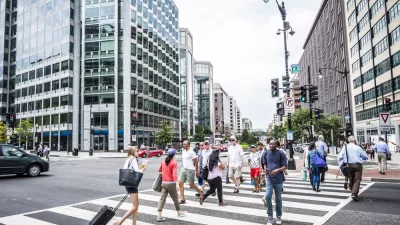Harvard economics professor Edward L. Glaeser argues that the United States has a long, pervasive pattern of anti-urban behavior that needs to change.
Glaeser writes, "Over the past 60 years, cities have been hit by a painful policy trifecta: subsidization of highways, subsidization of homeownership, and a school system that creates strong incentives for many parents to leave city borders. Nathaniel Baum-Snow, an economist at Brown University, has documented that each new federally-funded 'highway passing through a central city reduces its population by about 18 percent.'"
Glaeser goes on to argue that subsidizing homeownership is also anti-urban, benefiting suburban single-family homes over city apartments, and that educational policy has driven families out of inner cities in search of higher quality schools.
Interestingly, Glaeser also says that funding for trains is also anti-urban, because it "decreases the advantage of living close together in cities."
FULL STORY: Why the anti-urban bias?

Planetizen Federal Action Tracker
A weekly monitor of how Trump’s orders and actions are impacting planners and planning in America.

Restaurant Patios Were a Pandemic Win — Why Were They so Hard to Keep?
Social distancing requirements and changes in travel patterns prompted cities to pilot new uses for street and sidewalk space. Then it got complicated.

Map: Where Senate Republicans Want to Sell Your Public Lands
For public land advocates, the Senate Republicans’ proposal to sell millions of acres of public land in the West is “the biggest fight of their careers.”

Maui's Vacation Rental Debate Turns Ugly
Verbal attacks, misinformation campaigns and fistfights plague a high-stakes debate to convert thousands of vacation rentals into long-term housing.

San Francisco Suspends Traffic Calming Amidst Record Deaths
Citing “a challenging fiscal landscape,” the city will cease the program on the heels of 42 traffic deaths, including 24 pedestrians.

California Homeless Arrests, Citations Spike After Ruling
An investigation reveals that anti-homeless actions increased up to 500% after Grants Pass v. Johnson — even in cities claiming no policy change.
Urban Design for Planners 1: Software Tools
This six-course series explores essential urban design concepts using open source software and equips planners with the tools they need to participate fully in the urban design process.
Planning for Universal Design
Learn the tools for implementing Universal Design in planning regulations.
Heyer Gruel & Associates PA
JM Goldson LLC
Custer County Colorado
City of Camden Redevelopment Agency
City of Astoria
Transportation Research & Education Center (TREC) at Portland State University
Camden Redevelopment Agency
City of Claremont
Municipality of Princeton (NJ)





























